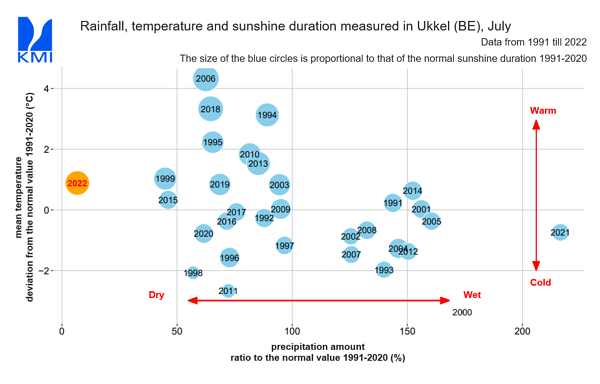Publié le 19 août 2022
The potato cultivation for example, flourishes in the typical “Belgian weather” with regular rainfall and moderate temperatures. Long episodes of drought, heat waves and intensive rains lead to an inferior quality and decreased production. Will our potatoes be fried before the yield? Let’s take a look at the measurements of the 200 CurieuzeNeuzen sensors installed over several potato fields across Flanders.
The summer of 2022, exceptionally dry! Or not any longer exceptional?
5,2 mm… that is the amount of rain reported for the month of July by the meteorological station of Brussels (Ukkel) in Belgium. The normal amount over the last 30 years is 77 mm. Only in 1885 it was even drier with 3 mm, but while this was very exceptional 137 years ago the actual drought is the fifth in the last six years. Also spring was very dry with a total amount of rainfall of 108 mm instead of the average 165 mm.
The lack of rain comes with high temperatures - especially in the last weeks - resulting in an actual shortage of 250-275 mm of water, and the summer isn’t over yet. Most parts of western Europe face a similar situation while southern Europe is caught in a long and sizzling heat wave.
The figure below illustrates the temperature and precipitation for July 2022. Note the extreme difference with July 2021 which was exceptionally wet.

Rainfall, temperature and sunshine duration measured in Ukkel (BE), July
The pattern of long dry spells and heat waves, interrupted by short episodes of intense rainfall, seems to be the new normal. While many of us love a warm & dry summer season, it is a dramatic evolution for the agriculture, nature and water supply in western Europe. Wheat, corn, sugar beet, vegetables, and grassland all benefit from the typical “Belgian weather” with regular rainfall and moderate temperatures.
Curieuzeneuzen tracks the heat and drought in Belgium
In 2021 ‘CurieuzeNeuzen in de Tuin’ was kicked off. This unique citizen science project measures the impact of heat and drought in Flanders (BE) by installing thousands of temperature and soil moisture sensors in private gardens, public green spaces and agricultural fields (focus on the cultivation of potatoes). However, the summer of 2021 turned out to be the wettest summer ever in Belgium. Despite the unexpected conditions a unique dataset could be collected and analyses have been made. Joris De Wolf explains what the measurements in a cool and wet season tell us in our previous blog ‘Citizen science in a potato fields: what did it teach us?’